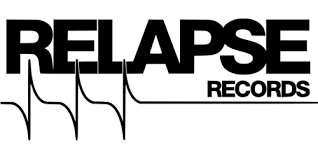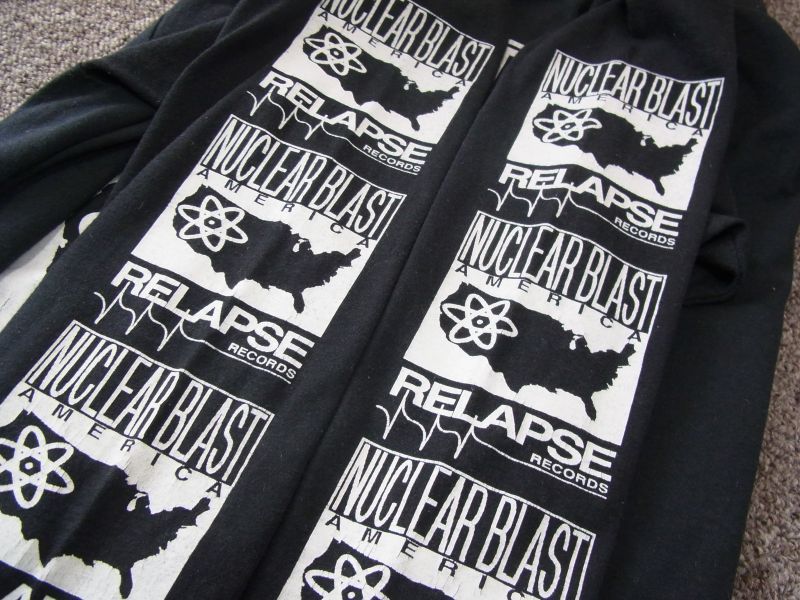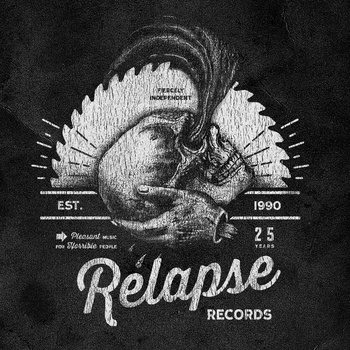This year, Relapse Records turns 25 years old. Jesus frickin’ fuck, where has the time gone?! It just seems like yesterday we were combing blurry ads and squinting our way through mail order reprints in fanzines for Suffocation and General Surgery EPs and Amorphis and Deceased full-lengths and here we are in 2015 with the label remaining at the forefront of underground extreme music. You’re probably going to stumble across as many Relapse-related retrospective interviews and features over the next 9-10 months as there have been releases by the label. With that in mind, while what follows is designed to be a celebration of sorts of what is arguably extreme music’s most consistent label, isn’t designed to be anything approaching an authoritative profile or definitive trawl through its history.
I’ve known Relapse’s Founder and President, Matt Jacobson – as well as many past and present employees – for years now, so what’s going to follow over two of the next four weeks is a transcription of a conversation I had with Matt concerning historical tidbits about the label, but also throws a few more open-ended questions at him than he’s probably already experienced. The celebration/tribute continues in the following two weeks with an interview with a long time employee who has a unique perspective on his work for and with the label. Congratulations! Now, bring back the Relapse message board…actually, don’t.
The story about you starting Relapse in your parents’ basement, the early 7”s and the original signings and releases is all a pretty well-known. But at what point did you have your “A-ha” moment where you realised this racket was viable and taking off? Or did you have that moment?
Matt Jacobson: Funny, there actually was a moment, but it was a little bit different than what I realised. First, I just want to get it straight and for the record that, technically, I’m the ‘Founder and President of Relapse,’ just to clear up any misconceptions. Anyway, I was sitting in my [former] business partner’s Bill [Yurkiewicz]’s parents’ basement – which was the second home to Relapse Records in the very early days – working late one night and I just had this moment where, all of a sudden, I was reflecting on what we had done so far, which up to that point wasn’t a lot in the grand scheme of things. But, I had this moment where I realised, “Wow, we’ve actually done more than I thought we could!” I was blown away at what we had been able to do as essentially a couple of kids and, in that moment, I thought that it was interesting and thought about the next stages or the trajectory we might have. The main thing I pulled from it is that I thought, “Why am I surprised?” It was then that I decided I’d never impose a glass ceiling on what we could do. Why would I assume that we couldn’t do things? This was actually a really big turning point and realisation in general, not just for Relapse, but for my view of the world. I’ve found that it’s one thing that often separates me from a lot of people. I so often meet people who will say stuff like, “I really want to start a business, or “I want to do this or do that,” and I’d be like, “Well, why don’t you?” and they’d say something about not being able to and I’d be like, “Why not?” I think that a lot of people’s default position is more about limitations or being afraid of the unknown or not thinking things are possible. That moment was when I thought that I shouldn’t assume things aren’t possible. I just started assuming everything is possible.
Okay, can you clear up the timeline a bit? By the time of this revelation, you were already in Pennsylvania. Did you move Relapse out east from your home in Colorado because that’s where Bill was?
As a matter of fact, Bill actually moved to Colorado first. It’s actually pretty insane when I look back because the day he arrived at the front door of my parents’ house and knocked on the door with his car load of stuff to move in, that was the first time I’d met him in person! I can imagine what my parents were thinking, letting this person none of us had ever met just move in [laughs]! He’d moved out there and we were there for about six months when my parents decided they were going to move back to Minnesota. At that point in time, we had only had 7”s out, so we had to decide if we were going to get jobs so we could pay rent and eat or if we were going to move to rural Pennsylvania and move in with Bill’s parents because I certainly wasn’t going to move to Pipestone, MN, where my parents actually still are to this day. It actually really, really worked out well. Being in South Central PA gave us great access to the whole scene, the touring circuit on the east coast and New York and all those things which was ideal for what we were doing, compared to being isolated in Colorado.
This is jumping ahead a bit, but is that why the office remains in Philly even though you are based in Portland, Oregon?
No, actually the reason it’s still there is really simple, man: it’s because we have a great crew and an awesome staff of people who have worked really hard and been with us for a long time. I know that a number of them are very rooted there with families and extended families and sports teams they have tattoos of [laughs] and all those sorts of things and I just didn’t want to force people to move or replace them. And I think it works just fine. We have a small office here where we have a few people and most of it is still in Pennsylvania. It really boils down to loyalty to the staff.
So, as Relapse was growing, I’m sure there were parts you were making up and figuring out as you went along. What were some of the standout moments or biggest mistakes your dealt with in the early years in getting to the point you felt comfortable making moves and really knowing what you were doing?
That’s an interesting question and I have to say for the most part – and I think this is part of what I was talking about in believing everything was possible – I don’t think I ever had times when I felt unsure about or afraid of what I was doing. For sure, when I started interacting with other businesses in the music industry like distributors, media and so on, there were times that maybe I was quieter, was the youngest guy in the room and was maybe self-conscious about that, but there were two moments in the early days that especially come to mind. The one that’s really funny happened at the old Foundations Forum back in the day. I was at the bar and talking to a sales guy I knew and was buddy-buddy with, which in retrospect is part of a sales guy’s job, and he was a little tipsy and at some point said, “You guys are my favourite client.” I’m like, “Really? Why?” and he said, “Because you always pay early and you pay rate card” which is basically full price for advertising. And I said, “What do you mean pay rate card? Doesn’t everyone pay rate card? Isn’t that what it’s for?” And he’s laughing, saying, “No one pays rate card!” I just didn’t know and had no frame of reference. So, that was a good lesson. Another time, I had gone out to Important Distribution before they were R.E.D. when they were in Queens, I think. It was my first trip there and I went by myself. I just thought I was going to meet and greet our main contact guy who I had been dealing with over the phone. We go into this conference room and a whole bunch people gathered and are talking about a bunch of stuff. Then, he introduces me and says, “Ok, go ahead Matt.” And I’m like, “Go ahead? With what?” He expected me to have a presentation ready and I had no idea that was their expectation because it had never been specifically discussed. It definitely took me a moment, but then I was excited about our upcoming records and just talked about them and it all worked out fine. Back then, I was aware that were a lot of things I didn’t know, but I’m generally not afraid to cold-call someone or ask a lot of questions. In retrospect, one of the other things that was a real turning point for the company, and it seems a little bit crazy, but I had cold-called Nuclear Blast because we heard they were looking to open a US office. I just basically called them saying, “Hey, I hear you guys are interested in doing this. We’re interested in doing it.” I also didn’t realise what a small operation Nuclear Blast was at the time because my perception was probably bigger than the reality.
Despite all the behind the scenes stuff and all the business stuff, ultimately it boils down to whether anyone wants to listen to the records your peddling or not.
Yeah, I guess it wouldn’t be necessary to learn about contracts and rate card and all that if no one was interested in what we were doing…
So, is there a “formula” to signing bands? What’s going through your head when you initially see a band like Dillinger, Nile or Amorphis?
I think to some degree, yeah there is, but some bands we heard the first time and right away you knew. Dillinger is the best example; first time I saw them, it was like, “Holy shit, this is game changer! This is something special and they’re doing something different.” In general, I’d like to say that some of the qualities we look for in bands are a combination of these elements: 1) if someone is able to do something fresh and original. And original could mean combining different elements that maybe haven’t been done before and I realise it’s getting harder and harder to do that; or 2) someone that’s influential in changing a genre and becomes a bookmark; or 3) when someone is – and I love this term – ‘Best in Class.’ A band that’s just doing whatever they do so fucking well! Not everything you put out is going to be totally original, but if someone is doing it as good as anyone in that category, or the best in that category, that’s pretty appealing. Having said that, it’s hard to put into words, but sometimes it’s the time and place. This band, for what they’re doing right now in this moment, is really special, and that’s how I felt about Mastodon. They were doing something so special in that moment.
Looking back on stuff like Resound ‘magalogue,’ the Contamination Fest/Tours, the original Relapse message board and the old record store in Philly, it would appear that the creation of community around Relapse has been important.
Yeah, the Relapse board was kind of like a pre-social network in a way, a little mini one, which is interesting. I don’t think any of that stuff was a conscious decision, but all of those things felt right. It’s interesting you bring that up because when I look at it now, pretty much every business I’ve been involved with, community in one form or another is really important. So, I feel like that’s just something that’s really natural. I never had the conscious thought about forming community, but I definitely see that it did. But the other over-arcing part of our philosophy is that we really try to do things from the fans’ perspective. That’s part of the reason that, in the past, there were definitely times where we would go the extra mile with our packaging or spend the extra money on things because we wanted something to be as awesome as it could without going bankrupt. As far as Resound and things like that, that was more like, “Wouldn’t it be awesome if…?” and done from the fans’ perspective.
By the way, the label has made available a 180 song compilation spanning the entirety of the label’s history. Here’s part of the official press release and a link to the best roadtrip accompanying comp ever…
“As part of the continued year long celebration for Relapse Records 25th anniversary, today the label has released a free 180+ song sampler spanning the label’s entire history. The sampler features one track from almost every artist that has ever released an EP or full-length with the label since 1990 including Mastodon, Neurosis, Obituary, Red Fang, Death, Dying Fetus, Necrophagist, Suffocation, Baroness, Dillinger Escape Plan, High on Fire, Torche, Pig Destroyer and many more. The sampler can be streamed and downloaded via Bandcamp HERE.








